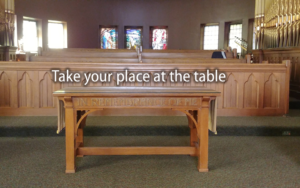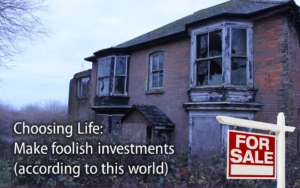Hespeler, 22 September 2019 © Scott McAndless
Amos 8:4-7, Psalm 113, 1 Timothy 2:1-7, Luke 16:1-13
Here is some very good, very wise advice from the First Letter of Timothy. “First of all, then, I urge that supplications, prayers, intercessions, and thanksgivings be made for everyone, for kings and all who are in high positions, so that we may lead a quiet and peaceable life in all godliness and dignity.” Yes, that seems very sensible. There are powerful people in this world, politicians, corporations, power brokers, and if you are smart, if you want to choose to have a good and quiet and peaceable life you are better off not challenging them, but rather seeking their blessing and, above all, letting them have their way.
We have had a perfect illustration of this principle on display for us in Hong Kong for many weeks now. The greatest political power in Hong Kong is the government of the People’s Republic of China. So, what do you do if you want to have a quiet and peaceable life in Hong Kong? Well, I’ll tell you what you don’t do. The very last thing you do is poke China with a great big stick which is basically what the people of Hong Kong have been doing for weeks now. And the results have been exactly what 1stTimothy warned against and life in Hong Kong has been anything but peaceable.
So it is true what it says, but at the same time, I think there must be more we need to take into account because, of course, there are some good reasons for why the people of Hong Kong have done what they’ve been doing. They are concerned and fearful for what China might do. They see injustice that needs to be resisted now, and really don’t feel as if they have much choice.

And that is the problem. As a general practice, not resisting and just praying for the people who have power seems like a good policy that will lead to life, but there are times and circumstances where a different approach definitely needs to be taken. Sure, it is great when powerful people are good or, at least competent. But what do you do when they are openly evil or criminally incompetent? Without naming any names of any particular politicians (because I know that you are all thinking of particular names yourselves), this seems to have become a very pressing issue of our times. Even in Canada with its long tradition of stable government, there are many things that are making people very nervous about leadership in the midst of a hyper partisan election season.
Fortunately, the First Letter to Timothy is not the only biblical advice that we have to go on when faced with such dire situations. We read a passage from the Book of Amos this morning where the prophet is bold to take on the rich and powerful people of his day for the ways in which they make themselves rich at the expense of the poorest people in society. He doesn’t just pray for them, he criticizes them. You might even say he gives them hell. So clearly there is more to what the Bible has to say about dealing with powerful people.
These two competing passages in the Bible kind of leave us in a difficult position. Often the Bible seems to be telling us that we should just support and pray for the people who are in charge, and at other times it encourages us to challenge them, particularly when they go wrong or do evil. So which message should we listen to? How do we figure out how we should act to live a truly abundant life?
Well, as usual, Jesus comes to our rescue, and he does it in one of the most surprising ways possible with the rather bizarre parable that we read from the Gospel of Luke this morning. Now, if you are like most people, you will read this parable of Jesus and you will just say, “huh?” what on earth is going on in this story.
We have a manager, somebody who works for and takes care of the financial affairs of his boss or master. Except, he is not a good worker. He is a bad manager who does a bad job and he is about to get fired because of it. This is the hero of Jesus’ story. And, when he finds out that he’s about to be fired, this bad employee comes up with a completely self-centered plot. He doesn’t steal from his boss, not exactly. But he calls in his boss’s clients and tells them that they can write down the debts that they owe him. That, in case you’re not clear on the point, is a felony. It is a criminal act and, once again, this guy is the hero of Jesus’ story? Jesus praises the guy, and indeed the guy’s own boss praises him as well. “And his master commended the dishonest manager because he had acted shrewdly,” Jesus says.
So, what are we supposed to do with this strange parable of Jesus? How can we take it and apply it to our lives today, because I am telling you that none of you better take the fact that I am preaching on this parable today and say that I told you that it is okay for anybody to commit financial fraud. That is exactly the danger that comes with interpreting a passage like this outside of its historical context. We have to read it in its context, so what is the context?
Well, there is something in this parable that we don’t even notice but that would have really bothered the people who first heard Jesus tell it. It says that the master in the story had many debtors. We read that and think, “No big deal,” because debt is a normal part of life and business for us. You need to understand that when Jesus said that word, debtor, it would have set off alarm bells in the crowd. Lending anything at interest at that time was illegal. It was contrary to the law of Moses and anyone who ran a business where he had multiple debtors would have immediately been regarded with suspicion for breaking that law.
Now, I understand that that makes absolutely no sense to us. Our modern economy is actually structured around debt and the paying of interest. Banks and most businesses could not function without it and our modern economy would likely collapse if we followed that Old Testament law and outlawed the charging of interest. But the people in Old Testament times and even in the time of Jesus lived under a very different economic system. In their world, people didn’t borrow to do things like start businesses or purchase property. Those weren’t even options. The only reason why you would borrow in that world was because you were starving and in dire straits and it was considered to be extremely unethical to charge interest in that kind of situation.
So that was the state of the law: lending at interest was illegal. But, as you can imagine, there were people, like the master in Jesus’ story, who still sought to profit by lending. So, what do powerful and wealthy people do when they see an opportunity to make money but the law gets in the way? Do they just shrug their shoulders and say, oh well, I guess I just can’t do it? Some do, but you know that there are always some who find a way. And usually the way that you find has to do with record-keeping.
If it is illegal to charge somebody interest, and somebody borrows from you, are you going to get your client to write down in your ledger book, “I, Samuel son of Bartholomew owe Scott son of William 80 containers of wheat plus 25% annual interest”? Of course not. You’re not going to write that because you will have now created a record of your illegal activity. Rich people don’t get rich by being stupid so they didn’t do that.
But, of course, you still need records of what people owe you. So what do you do? You simply get your debtor to write down, “I, Samuel son of Bartholomew owe Scott son of William 100 containers of wheat in one year,” but you only give them 80 containers of wheat.
And that is what happened in Jesus’ world. Everyone knew that it happened and everyone understood how it worked. But the wealthy people who were in charge got away with it because there was no proof. Now, I know that it might sound a bit like I’m saying that powerful and wealthy people are all criminals or that they are naturally unethical. Of course, that is not true. I honestly don’t think that they are anymore or any less ethical than any other segment of the population. But one thing has always been true and it’s still true today. Rich and powerful people who are unethical get away with it way more often than anyone else.
So, if you understand all of that, this parable of Jesus suddenly sounds very different. Everybody understood what Jesus was saying. When the unscrupulous manager called in the debtors and told them to change the amount that they owed on the record, he was actually deducting the interest. He is actually making right what was contrary to the law. And it’s kind of interesting if you do the math. In the case of the wheat, he removed 25% interest, which is certainly bad enough. I mean, that is in the area of what you would get from a payday loan company these days. Don’t ever go to a payday loan company! But in the case of the olive oil, the interest rate is actually 100%! That is so clearly wrong that I imagine the people in the crowd gasped when Jesus said it.
And that is why the crooked manager got away with it. His master could hardly report him for what he did because that would mean admitting that he had broken the law in the first place. In fact, as Jesus says, he had to praise him. I can just imagine the press conference: “I’d like to thank my manager for drawing my attention to the errors made in my accounts where the amounts that people owed were inflated for some unexplained reason. The people responsible for this mistake will be found and fired.” He didn’t want to say that, he had to say it.
It also explains, of course, how Jesus can portray this manager as a kind of hero. It’s not because his actions are all right but because his self-centered actions nevertheless resulted in some justice. What he had the people write down was what was right according to Jesus and corrected the injustice committed by the master.
Now, the application of this parable can be a little bit tricky. As I said, I don’t want anyone to take this parable as saying that it’s okay for anyone to commit financial fraud. I don’t think that was ever the intention. At the same time, I don’t think that a direct application of the morality of Jesus’ time to today is very helpful either. Just because the charging of interest was immoral in the economy of Jesus’ world, doesn’t mean that there is not a legitimate place for it today.
No, I think that you need to be a little more subtle when applying this one. The specific actions taken by the crooked steward are not really something to be followed literally. I think it’s more of a case of Jesus speaking to the people and saying, “Look, things are pretty messed up in our world. I mean, when you have people being charged 100% interest on olive oil, you’ve got problems. But look here,” he’s saying, “here’s some justice that got done maybe despite the intentions of everyone involved. Isn’t God amazing?” That’s what Jesus was saying.
But even more important than that, Jesus is saying that there are ways to write down what’s right. Maybe the rich and powerful people hold all the cards. Maybe you can’t challenge them directly. Maybe the wise thing to do is to show that outward support and pray for them. But maybe God will also send you opportunities to act for justice, to write down what’s right, and you should take them when they come. I mean, look what a crooked, conniving and self-centered steward was able to accomplish. Now, what do you think might happen when the children of light find their ways to work behind the scenes to write down what’s right.
Choose life; choose justice. The two don’t have to be at odds with each other.
 The Athalie Read Group is having a Gold Sale on September 26th from 6-8 pm. Bring your items and see how much they are worth, then decide if you want to sell them. Not able to be here that night? Talk to any member of the group to pick up your items and act as your personal representative. For more info please call Carol Jones at 519-658-4394
The Athalie Read Group is having a Gold Sale on September 26th from 6-8 pm. Bring your items and see how much they are worth, then decide if you want to sell them. Not able to be here that night? Talk to any member of the group to pick up your items and act as your personal representative. For more info please call Carol Jones at 519-658-4394 

